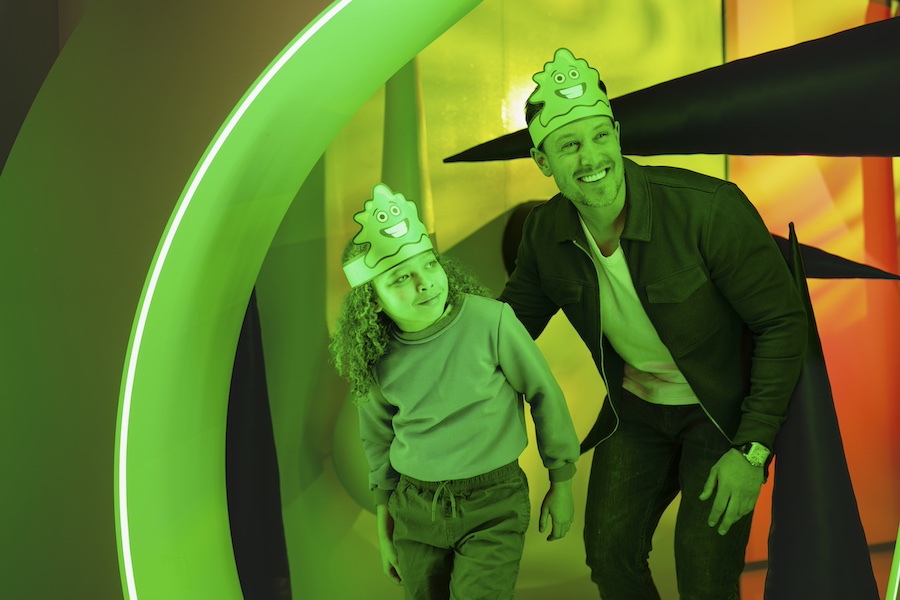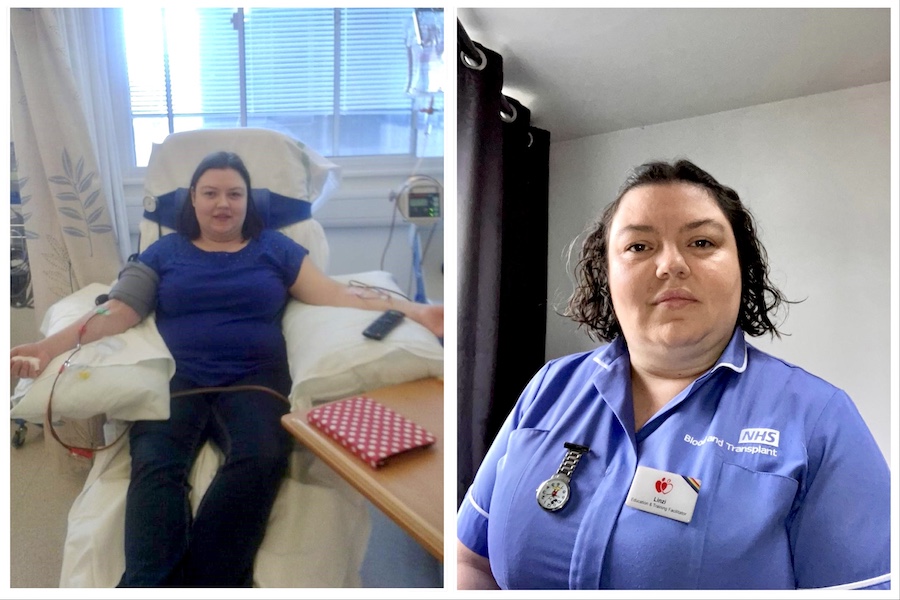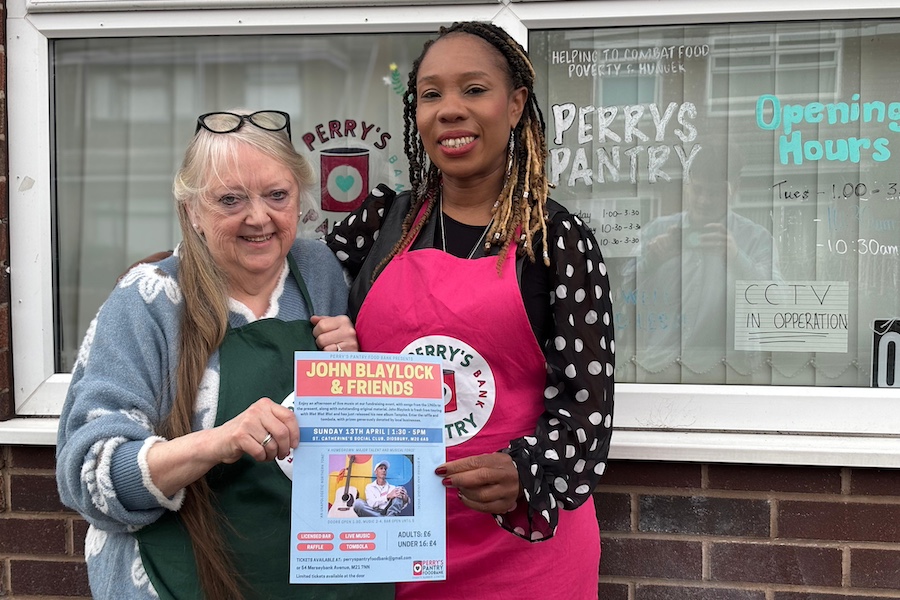Meet the heroic Greater Manchester midwives on the NHS frontline
- Written by I Love MCR
- Last updated 11 months ago
- City of Manchester, Health & Wellbeing, People
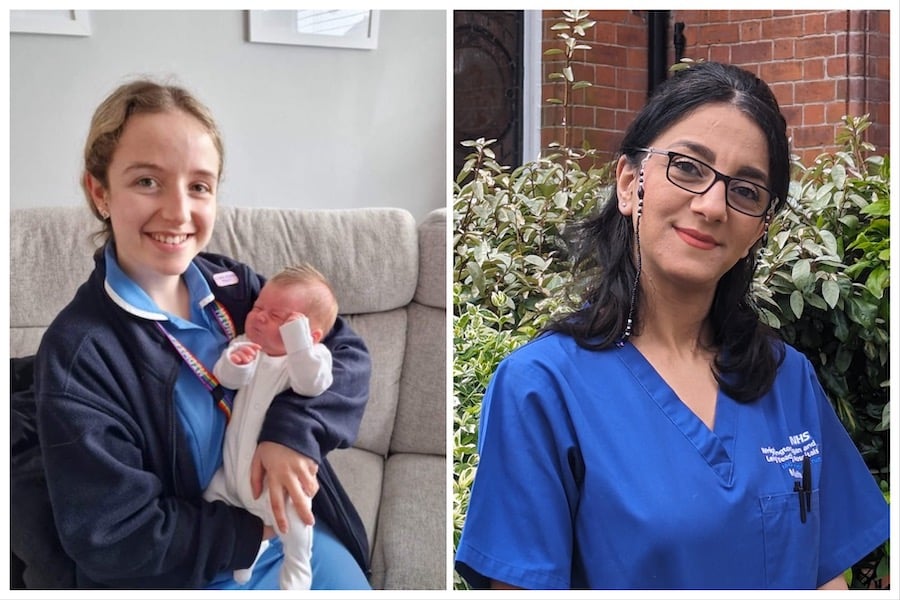
As the world gears up to celebrate International Day of the Midwife this Sunday, 5 May 2024, it’s time to shine a spotlight on the incredible work of midwives, particularly those serving within the Greater Manchester region of the NHS.
With 1,534 dedicated midwives tirelessly caring for expecting mothers and safely delivering over 34,000 babies annually, the impact of their work cannot be overstated.
International Day of the Midwife
It’s time to celebrate the remarkable individuals who dedicate their lives to supporting mothers and their babies through the journey of pregnancy, childbirth, and beyond.
Fataneh Hakimifard
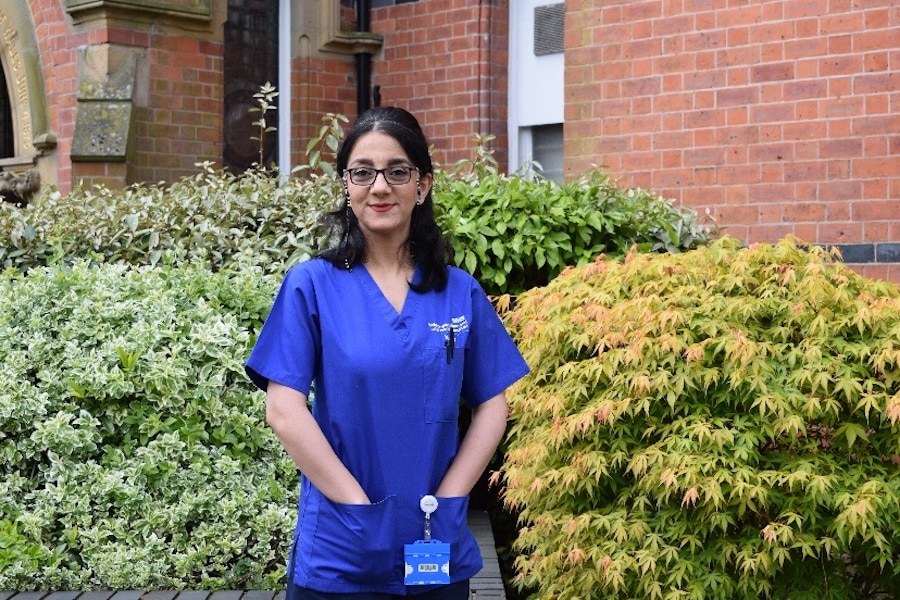
Originally from Iran, Fataneh’s journey to becoming a midwife stemmed from a profound desire to make a difference in people’s lives.
“I have always had an interest in biology, and the labour and delivery process fascinated me,” Fataneh shares.
“I wanted a career that brought happiness and made a meaningful impact, which led me to choose midwifery.”
Fataneh’s journey took her to India, where she volunteered as a midwife for two years before seizing the opportunity to apply for a position with the NHS in the UK.
Despite initial nerves, her passion for helping others and the allure of working within the renowned NHS compelled her forward.
Upon her arrival in the UK, Fataneh underwent extensive training and examinations to ensure her readiness to practice. She then embarked on a personalised 12-month program at WWL, designed to hone her skills and integrate her into the UK’s healthcare system.
Reflecting on her experience, Fataneh expresses gratitude for the opportunities the NHS has provided her to grow both personally and professionally.
“Being part of such a special moment in someone’s life is truly rewarding,” she says, highlighting the joy she finds in supporting women and families throughout their delivery journey.
Eleanor
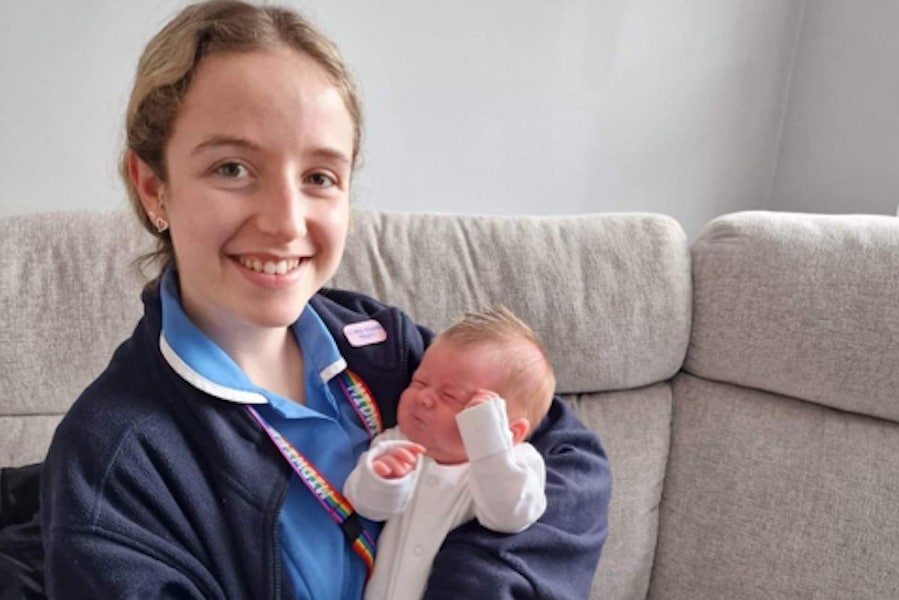
midwife Eleanor
Eleanor (pictured with baby Arlo) is a midwife at Stockport Foundation Trust and supported Sarah who gave birth to her fifth child in 2022.
Eleanor worked closely with Sarah, who is autistic, to create her personalised care and support plan so that her care was centred around her individual needs and circumstances
With Eleanor’s support, Sarah developed a personalised care plan that prioritised her comfort and autonomy.
From arranging a home birth to transitioning to hospital care when necessary, Sarah felt heard and empowered throughout her journey.
“I felt in control and listened to throughout the whole process,” Sarah reflected gratefully. “I can’t thank my midwife, Eleanor, and the rest of my care team enough for the care and compassion we received.”
Melina
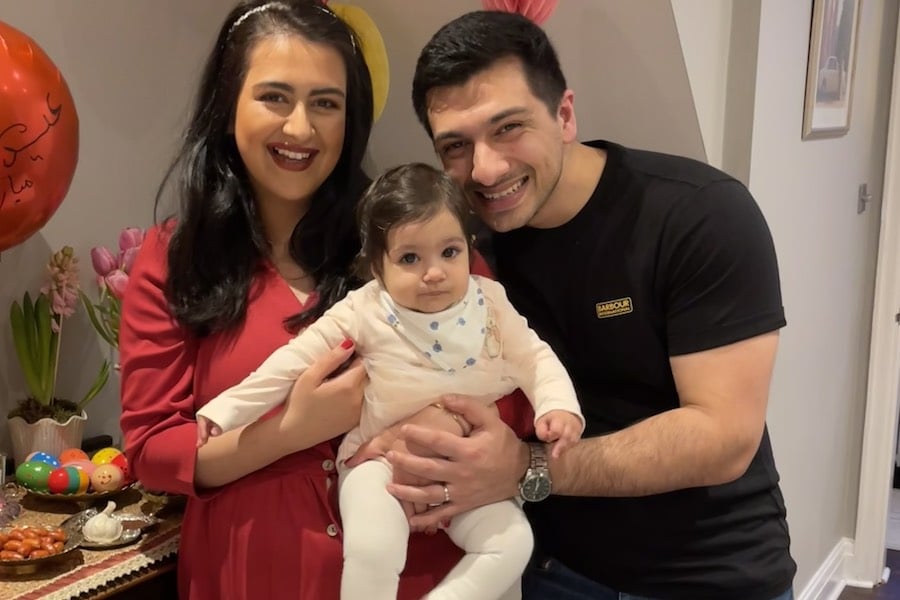
Melina, a dedicated midwife at Wythenshawe Hospital, experienced both the heartbreak of loss and the joy of new life within the walls of the same maternity ward she calls home.
Since beginning her training in 2012, Melina Saebi from Cheadle has worked in the Delivery Suite at Wythenshawe Hospital, run by Saint Mary’s Managed Clinical Service. In 2021, she was so excited to find that she was pregnant with her first child with her husband, Dan.
Melina, aged 29, said: “It was always the plan to deliver on the ward where I work because I wanted to be looked after my colleagues. It felt like being in your second home”.
Tragically, Melina and Dan received the devastating news that their first baby had a rare and severe heart condition which meant she would not survive.
At 21 weeks, Melina gave birth to their first baby girl, Lily, who survived for a few precious hours but then sadly died.
Melina said: “We were devastated to lose Lily, and when you’re a midwife, it can be even worse because you have all the knowledge of what’s happening to you.”
After tragically losing her first child, Lily, Melina found solace and support through the Lotus Team, a specialised service offering compassionate care to families navigating the grief of stillbirth or neonatal death.
With the guidance of her close friend and colleague, Olivia, Melina discovered the healing power of continuity of care, eventually finding hope again as she embarked on her journey towards motherhood.
Her subsequent pregnancy, under the tender care of the Lotus Team, resulted in the birth of her daughter, Rosie, thanks to the unwavering support of her NHS family.
Kirsty, Gail, and Jenni

Three midwives, Kirsty Yates, Gail Ballance and Jenni Mason, live and breathe their profession, and have seen how important the recent advancements in knowledge, technology and research have improved outcomes for pregnant women in Manchester.
Kirsty, who first qualified back in 2001, said: “Everything about midwifery has changed since I began. Women have more knowledge about their bodies than they ever have before and there are far more investigations and testing as to why some pregnancies become more complex.
“There is a lot more choice in pregnancy and how women give birth, and it’s all for the good of the woman.”
Jenni began her training in 2003 and works at Saint Mary’s Hospital at MFT’s Oxford Road Campus. She said: “You’ve got to keep up with the times more than any other aspect of medicine. Our research and our clinical practice are changing all the time, especially at Saint Mary’s.
“Sometimes it can be hard to keep up, but our staff are used to change and being on top of their game. It’s a profession that’s never standing still.”
The changing face of midwifery
One huge advancement in maternity is the introduction of a wide range of specialist clinics supporting expectant mothers, with Saint Mary’s providing care to pregnant women with health conditions such as diabetes, pre-eclampsia and cystic fibrosis.
Gail began training as a midwife in 1988 and works in the Antenatal Clinic at Wythenshawe Hospital. She said: “The opening of so many specialist services didn’t happen overnight, but it just shows how much our knowledge has grown. You didn’t really see ladies with these medical conditions having babies when I first started my career.
“30 years ago, the only specialist midwives were working towards reducing teenage pregnancy rates. Although these roles still exist, now, we care for a much wider range of ages, and it’s not unusual for someone to be 35 having their first baby.”
There has also been an increase in the rate of caesarean sections performed. Previously, a maternity unit with a high rate of natural births was considered more successful, however, there has been a shift in attitude.
Jenni said: “Women with complex conditions tend to deliver via a caesarean section rather than a natural birth, so an increase in c-section rates actually shows that these women are having more successful pregnancies.
“We are aware that there is a public perception that one method of birth is ‘better’ than the other, but you have to take all factors into account with what you recommend – the best method of birth is what is safest for the woman and baby”.
20 years ago, it wasn’t unusual for a woman to stay in hospital for up to five days after giving birth to her baby. Now, due to the growth in research and knowledge, women can be discharged within 24 hours so they can be at home with their new baby quicker.
Kirsty said: “Unless women have a condition, pregnancy isn’t an illness, and lots are healthy who want to go home”.
Outside cultural changes have also impacted maternity services and how women give birth. The growth of social media has changed society as we know it and has made knowledge a lot more accessible to patients, but this also comes with drawbacks as expectant parents compare themselves to influencers.
Gail said: “Social media has only emerged in the past 15 years or so. It’s a great thing that people have more information on their health, but it also means that people are more likely to compare their pregnancy and births with others – which can cause more anxiety. I advise everyone who I care for to not look at influencers as it’s only one little snapshot of a wider picture.”
There have been various technological advancements which have dramatically improved patient outcomes.
Jenni said: “Around three years ago, we introduced screening tests to find out the baby’s blood group based on fetal DNA found in the mother’s blood.
“In layman’s terms, if a mum and baby have mismatched blood types, this can mean that the mother builds antibodies against the baby. This could affect around 15% of the population and can even lead to miscarriages. Now we can detect and treat with an injection known as Anti-D Immunoglobulin to protect against the incompatibility.”
Kirsty works as a Delivery Suite Coordinator at the North Manchester site of Saint Mary’s Managed Clinical Service. Recently, this site hosted a study trial where pregnant women were offered rapid bedside testing for Group B Streptococcus (GBS), a life-threatening form of bacteria.
Kirsty said: “This test meant that women could be tested for the bacteria before they give birth and, if it’s positive, we can quickly administer antibiotics to protect the baby. Hopefully, this will be rolled out across the country soon.
“When I was studying, I’d heard of Strep B and the damage that it can cause, but never thought we would have such advanced technology to detect it so quickly and easily.”
Prescribing magnesium sulphate to treat pre-eclampsia has been around since the early twentieth century, but within the past ten years, it was proven that there were also benefits for premature babies from developing neurological conditions.
Kirsty said: “I was speaking with a family friend who is currently applying to be a midwife.
Her sister has a mild form of cerebral palsy, so when I was discussing the benefits of using magnesium with her, she was absolutely fascinated to learn that if her mother received this treatment, then there could have been a chance that she wouldn’t have this condition.
“I saw the passion in her eyes, and I told her to never lose that feeling while she works as a midwife.”
These midwives embody the spirit of the NHS, and as we honour their commitment, let’s ensure their legacy of compassionate care continues to flourish.
You can find out more about International Day of the Midwife by clicking here
- This article was last updated 11 months ago.
- It was first published on 3 May 2024 and is subject to be updated from time to time. Please refresh or return to see the latest version.
Did we miss something? Let us know: press@ilovemanchester.com
Want to be the first to receive all the latest news stories, what’s on and events from the heart of Manchester? Sign up here.
Manchester is a successful city, but many people suffer. I Love Manchester helps raise awareness and funds to help improve the lives and prospects of people across Greater Manchester – and we can’t do it without your help. So please support us with what you can so we can continue to spread the love. Thank you in advance!
An email you’ll love. Subscribe to our newsletter to get the latest news stories delivered direct to your inbox.
Got a story worth sharing?
What’s the story? We are all ears when it comes to positive news and inspiring stories. You can send story ideas to press@ilovemanchester.com
While we can’t guarantee to publish everything, we will always consider any enquiry or idea that promotes:
- Independent new openings
- Human interest
- Not-for-profit organisations
- Community Interest Companies (CiCs) and projects
- Charities and charitable initiatives
- Affordability and offers saving people over 20%
For anything else, don’t hesitate to get in touch with us about advertorials (from £350+VAT) and advertising opportunities: advertise@ilovemanchester.com
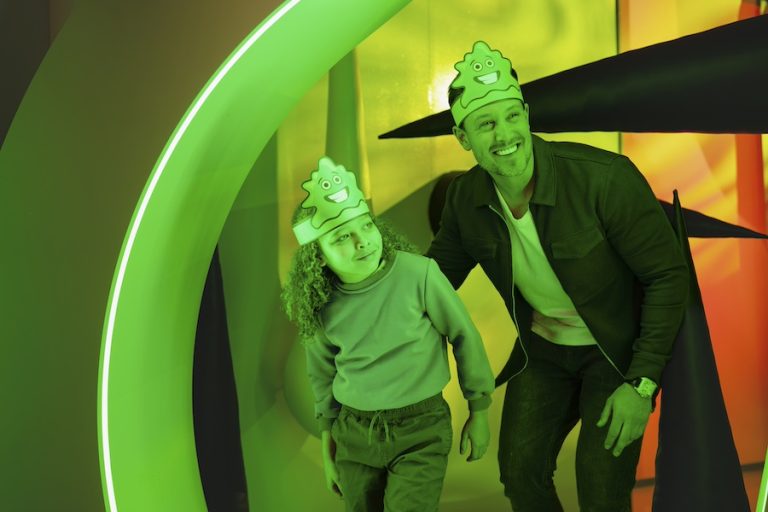

Review: Tambo & Bones at HOME is ‘ambitious, bold, gutsy…. and terrific’

Review: JB Shorts 26 at 53two is ‘a five-star showcase of northern talent’









